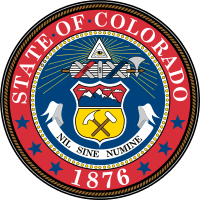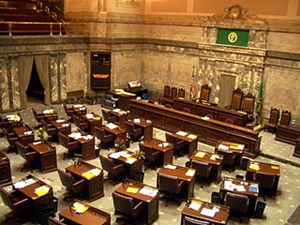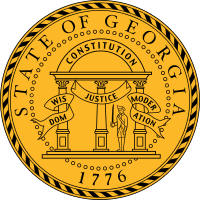February 4, 2014 •
Former Quebec Premier Accused of Accepting Illegal Contribution
Former Quebec premier, Jean Charest, is accused of accepting $3,000 from a lobbyist while in office. The payment occurred just days before the 2008 general election and was given by a senior executive at a windmill manufacturing company. Charest denies […]

Former Quebec premier, Jean Charest, is accused of accepting $3,000 from a lobbyist while in office. The payment occurred just days before the 2008 general election and was given by a senior executive at a windmill manufacturing company.
Charest denies the allegation, according to current premier Phillipe Couillard. The allegation stems from the testimony of Louis-Pierre Lafortune, who was an investor in the same windmill manufacturing company.
The lobbyist who allegedly delivered the check to Charest has not been identified. The windmill company went bankrupt in 2010.
February 3, 2014 •
San Diego Mayoral Runoff Election
On November 19, 2013, a special election was held to replace former mayor Bob Filner, who submitted his resignation amid scandal. Because no candidate received more than 50 percent of the vote, a runoff election is scheduled for February 11, […]

On November 19, 2013, a special election was held to replace former mayor Bob Filner, who submitted his resignation amid scandal. Because no candidate received more than 50 percent of the vote, a runoff election is scheduled for February 11, 2014.
Individuals may contribute up to $1,000 to the mayoral candidates for the runoff election. Contributions from committees and corporations are not permitted in city elections.
Seal of San Diego courtesy of Zscout370 on Wikimedia Commons.
January 31, 2014 •
Court of Appeals Finds Colorado Contribution Limits Unconstitutional
On January 15 the United States Court of Appeals for the Tenth Circuit declared certain Colorado campaign contribution limits unconstitutional. State law requires major party candidates to appear on a primary ballot even if they are running unopposed; they are […]

On January 15 the United States Court of Appeals for the Tenth Circuit declared certain Colorado campaign contribution limits unconstitutional. State law requires major party candidates to appear on a primary ballot even if they are running unopposed; they are then permitted to accept contributions up to the statutory limit for each of the primary and general elections. Similarly, minor party or write-in candidates who appear on the primary election ballot may accept contributions for both the primary and general elections.
Unaffiliated, minor party, or write-in candidates who do not appear on a primary election ballot, however, may only accept contributions for the general election.
Under the recent ruling, contribution limits based on statutory classification violate the right to equal protection for individuals wishing to contribute to write-ins, unaffiliated candidates, and minor party candidates when each candidate runs unopposed for the nomination.
The Secretary of State has not yet addressed the court ruling or made any new changes to existing contribution limits.
January 31, 2014 •
Two New Proposals May Clarify Philadelphia Gift Law
Two proposals in Philadelphia could finally establish a dollar limit on gifts to city employees. The city’s Board of Ethics again revised its proposed gift limit to $50 with an outright ban on cash gifts. The initial proposals allowed for […]

Two proposals in Philadelphia could finally establish a dollar limit on gifts to city employees. The city’s Board of Ethics again revised its proposed gift limit to $50 with an outright ban on cash gifts.
The initial proposals allowed for some measure of cash gifts based on interpretation of city law allowing some cash gifts, enraging ethics watchdogs. After a reinterpretation by the city law department allowing the Board to ban cash gifts, the ban was included in the latest proposal. A final vote on the gift regulation is expected at the Board’s February 19 meeting.
The Philadelphia City Council is also considering a gift measure, allowing city officials and employees to accept gifts up to $99. The Council’s proposal also bans all cash gifts.
If the Council passes the gift law, the Board of Ethics will need to restart work on its gift regulation, as it can only pass regulations interpreting city law and may not impose a stricter limit than established by statute. Either way, the city appears to be on track in providing much needed clarification of its gift law.
January 31, 2014 •
FEC Releases Legislative Recommendations
The Federal Election Commission (FEC) released its package of legislative recommendations this week. All eight recommendations were unanimously approved by the commission with the hope Congress will implement the changes. Some of the changes proposed include requiring electronic filing of […]

The Federal Election Commission (FEC) released its package of legislative recommendations this week. All eight recommendations were unanimously approved by the commission with the hope Congress will implement the changes.
Some of the changes proposed include requiring electronic filing of electioneering communications reports, making permanent the Administrative Fine Program for the delinquent filing of reports, and increasing and expanding the prohibitions on fraudulent misrepresentation of campaign authority.
Noting other federal and state agencies receive “donated services and products for information technology projects,” the FEC would also like Congress to authorize the commission to have the ability to accept such gifts for use in continuing “its efforts to facilitate transparency in the federal campaign finance system through a state-of-the-art, web-based public disclosure system.”
January 31, 2014 •
San Bernardino County, California Modifies Campaign Finance Ordinance
The Board of Supervisors unanimously approved revisions to the campaign finance reform ordinance. The changes were requested by the state Fair Political Practices Commission (FPPC), which enforces the county ordinance. Under the revised ordinance, contributions may be received for a […]

The Board of Supervisors unanimously approved revisions to the campaign finance reform ordinance. The changes were requested by the state Fair Political Practices Commission (FPPC), which enforces the county ordinance. Under the revised ordinance, contributions may be received for a general election before the primary has taken place, so long as the funds are set aside until after the primary.
The term “independent expenditure committee” will be removed from a section pertaining to electronic filing requirements for contributions of $10,000 or more and will be replaced with the more inclusive “other person, entity, or committee.”
The board also authorized new language in the ordinance giving the FPPC permission to give technical assistance to donors in the same manner it advises candidates.
The revisions are scheduled for final adoption on February 11, 2014.
January 31, 2014 •
News You Can Use Digest – January 31, 2014
National: Bob and Maureen McDonnell Join the Club: Political spouses facing scandal Washington Post – Krissah Thompson and Richard Leiby | Published: 1/28/2014 The latest scandal on the political scene is the indictment of former Virginia Gov. […]

National:
Bob and Maureen McDonnell Join the Club: Political spouses facing scandal
Washington Post – Krissah Thompson and Richard Leiby | Published: 1/28/2014
The latest scandal on the political scene is the indictment of former Virginia Gov. Robert McDonnell and his wife, charged with trading on his office to provide assistance to a local businessperson in exchange for gifts and loans. Do such charges harden the resolve of political couples, who by definition are accustomed to facing adversaries, or does it tear the relationship apart?
Federal:
After ‘I’ll Break You in Half,’ House Member Apologizes
New York Times – Sarah Wheaton and Marc Santora | Published: 1/29/2014
U.S. Rep. Michael Grimm (R-N.Y.) apologized after he physically threatened a reporter in the Capitol after President Barack Obama’s State of the Union address. In a video of the incident, Grimm can be heard telling Michael Scotto, a reporter for NY1, “I’ll break you in half.” Moments earlier, Grimm had walked away from an interview when Scotto began asking him questions about allegations of campaign finance violations. According to a transcript, Grimm also threatened to throw Scotto off a balcony.
How Lawmakers Skirt the Law to Keep Their Next Jobs Secret
National Journal – Billy House | Published: 1/21/2014
Critics say a law designed to prevent conflicts-of-interest and shed light on lawmakers who negotiate for post-Capitol Hill work while still in office has failed, worn thin by a series of administrative rulings and narrow interpretations. Because the law has yielded almost none of the public information it was designed to provide, it remains largely unknown whom lawmakers negotiate with, and whether their official duties present any conflicts with those employers.
From the States and Municipalities:
Colorado – Federal Court Overturns State Political-Funds Law
San Francisco Chronicle; Associated Press – | Published: 1/24/2014
The 10th U.S. Circuit Court of Appeals ruled a Colorado law imposing disparate campaign contribution limits for major-party vs. minor-party, unaffiliated, or write-in candidates violates the U.S. Constitution. The law allows Republicans and Democrats to collect an extra $200 per donor because they sometimes have intra-party primaries. But the law allows them to spend all their money on the general election if they wish. The court said that discriminates against donors to minor-party candidates.
Connecticut – Legislators Again Look to Lobbyists for Money
Hartford Courant – Jon Lender | Published: 1/28/2014
Georgia
Staffing Situation Worsens at Georgia’s Ethics Commission with resignation of Lead Assistant
Columbus Republic – Christina Cassidy (Associated Press) | Published: 1/27/2014
Lisa Dentler, the lead assistant to Georgia ethics commission Executive Secretary Holly LaBerge, has resigned and the agency’s staff attorney remains on administrative leave. LaBerge wrote in an email to commissioners that the departure “leaves the agency in a dire situation as she has been doing the work of two positions.” LaBerge has said six employees have either quit or been fired since she took over in September 2011.
Idaho – Why It’s Tough to Track What Lobbyists Give to Idaho Lawmakers
KBSU – Emilie Ritter Saunders | Published: 1/30/2014
Lobbyists in Idaho have spent more than $1 million over the last two years advocating for their clients at the Legislature. The law requires lobbyists to report the recipient of their generosity only when the value of the gift is more than $105. Even with that glimmer of disclosure, it is hard to find out which lawmaker accepted a gift above the threshold because Idaho does not have a searchable electronic database.
Louisiana – Nagin’s Trial a Coda to an Odd Political Career
Baton Rouge Advocate – Gordon Russell | Published: 1/26/2014
Former New Orleans Mayor Ray Nagin is now on trial, facing charges he accepted bribes and free trips among other things from contractors in exchange for helping them secure millions of dollars in city work. The charges are the product of a City Hall corruption investigation that already has resulted in several convictions or guilty pleas by former associates of Nagin.
Massachusetts – Court to Hear Supermarket Politics Challenge
Boston Globe – Denise Lavoie (Associated Press) | Published: 1/26/2014
For decades, supermarkets have been a favorite place for candidates in Massachusetts to shake hands, collect signatures, and offer a quick rundown of their views on the issues of the day. But not all supermarket chains are in favor of the tradition. The state’s highest court is being asked to decide whether a supermarket’s decision to turn away a political candidate violated his constitutional rights.
Michigan – Ethics Proposal Nixed in Warren
Macomb Daily – Norb Franz | Published: 1/28/2014
The Warren City Council rejected a proposed ethics law that would prohibit fraternization, including intimate relationships, between city bosses and subordinates. The nearly year-old measure was revived in the wake of clandestine video that surfaced of Mayor James Fouts with mayoral assistant Amanda Mika, including images of the duo holding hands. The video has triggered a firestorm because the mayor granted Mika a $5,000 pay raise in December.
Montana – Political Practices Commissioner Accused of Using Questionable Tactics to Get Results
Billings Gazette – Mike Dennison | Published: 1/26/2014
The aggressive stance of Montana’s commissioner of political practices, Jonathan Motl, against what he sees as illegal campaign activity by so-called dark money groups and their favored candidates is raising eyebrows among supporters and critics alike, the latter of whom are calling Motl everything from a “partisan hack” to a misguided crusader on a “witch hunt.”
Nevada – Lawmakers Have to Declare Gifts But Aren’t Willing to Define Them
Las Vegas Sun – Andrew Doughmsn | Published: 1/26/2014
A few elected officials in Nevada who accepted gifts sometimes worth thousands of dollars declined to report them as required by state law. They dispute whether they legally need to file disclosers, in part because there is no explicit definition of a “gift” in state law. Secretary of State Ross Miller said there are likely numerous elected officials who are receiving reportable gifts and not listing them on disclosure forms. But “there’s no way for us to know” for sure, said Miller.
New York – Donor Secrecy Remains Big Issue
Albany Times Union – Rick Karlin | Published: 1/28/2014
The Joint Commission on Public Ethics declined to shield the financial reports of four advocacy groups that say public disclosure of their financial backers is likely to result in threats or even harm. The commission requires reports from state lobbyists, though it can withhold records of contributors to lobbying groups that show their donors would likely face danger if reported.
Pennsylvania – City Council Mulls Ban on Cash Gifts to Phila. Officials
Philadelphia Inquirer – Claudia Vargas | Published: 1/30/2014
A bill introduced in the Philadelphia City Council would ban all city employees and officials from receiving cash gifts. The proposed ordinance would also cap the total value of gifts received in a calendar year at $99. The bill is a result of discussions among various ethics officials and outside watchdog groups over how to interpret a vague section in the city code that deals with gifts.
Texas – Life Story of Wendy Davis Swings from Strength to Flash Point in Texas Campaign
New York Times – Manny Fernandez and Laurie Goodstein | Published: 1/29/2014
Since questions were raided about whether she had fudged some items in her biography, Texas Sen. Wendy Davis, who is running for governor, has been under attack for omitting the fact that her second husband helped pay for her Harvard Law School education and her two children mostly stayed in Texas while she was there. The controversy has prompted a debate over culturally charged questions about a woman’s balance of work, ambition, and parenthood.
 State and Federal Communications produces a weekly summary of national news, offering more than 80 articles per week focused on ethics, lobbying, and campaign finance.
State and Federal Communications produces a weekly summary of national news, offering more than 80 articles per week focused on ethics, lobbying, and campaign finance.
News You Can Use is a news service provided at no charge only to clients of our online Executive Source Guides, or ALERTS™ consulting clients.
January 29, 2014 •
South Carolina Weather Freezes Legislative Session
The Legislature is not meeting this week because of the winter storm in the Carolinas. Most legislative meetings are also canceled. Gov. Nikki Haley declared a state of emergency on Tuesday, January 28, as light sleet began falling on the […]

The Legislature is not meeting this week because of the winter storm in the Carolinas. Most legislative meetings are also canceled.
Gov. Nikki Haley declared a state of emergency on Tuesday, January 28, as light sleet began falling on the state capital.
The Legislature will resume its normal schedule next week on Tuesday, February 4.
January 27, 2014 •
Washington Senate Bill 6414 Mandates Electronic Filing, Public Availability of Reports
Senate Bill 6414, introduced this week by a group of Washington senators led by Senator Joe Fain, requires all reports to be filed electronically. The bill contains several other strictures, including requiring the Public Disclosure Commission to make all filings […]

Senate Bill 6414, introduced this week by a group of Washington senators led by Senator Joe Fain, requires all reports to be filed electronically. The bill contains several other strictures, including requiring the Public Disclosure Commission to make all filings available on its website, mandating each lobbyist or lobbyist’s employer sharing in an expenditure greater than $25 to report the specific dollar amount of his or her share, and requiring all lobbyist filings to include an itemized list of all payments made to a state official, regardless of dollar amount.
Another section of the bill implores the Ethics Board to define the limits of “infrequent occasions” in the context of the acceptance of gifts of food and beverages by public officials from lobbyists. This section of the bill comes after a widely-read report showing the state’s 50 most active lobbyists pampered legislators with meals totaling more than $65,000 over a four-month period.
A final section of the bill allows lobbyists to avoid reporting expenses for a legislator’s food at a meeting with the lobbyist if such expenses were paid by the legislator.
Photo of the interior of the Washington State Capitol courtesy of Eric Hunt on Wikimedia Commons.
January 27, 2014 •
Washington Senate Bill Prohibits Political Contributions While Legislature is Out of Session
Senate Bill 5988, introduced January 13, 2014, would prohibit state officials from soliciting or accepting political contributions in odd-numbered years when the legislature is out of session but has not adopted or submitted to the governor a biennial operating appropriations […]

Senate Bill 5988, introduced January 13, 2014, would prohibit state officials from soliciting or accepting political contributions in odd-numbered years when the legislature is out of session but has not adopted or submitted to the governor a biennial operating appropriations act.
The bill would further prohibit the governor or any person employed by the governor from soliciting or accepting contributions during the period provided for the consideration of bills under the Washington constitution.
Photo of the Washington State Senate Chamber courtesy of Lincolnite on Wikimedia Commons.
January 24, 2014 •
Vermont Enacts New Contribution Limits
Vermont has passed comprehensive campaign finance reform early in the second year of its biennial session. Senate Bill 82, signed by Governor Peter Shumlin on January 23, repealed Vermont’s existing campaign finance law and enacted a new framework in […]
 Vermont has passed comprehensive campaign finance reform early in the second year of its biennial session. Senate Bill 82, signed by Governor Peter Shumlin on January 23, repealed Vermont’s existing campaign finance law and enacted a new framework in its place. The most notable provision of the bill is new campaign finance limits. The new limits, effective January 1, 2015 are as follows:
Vermont has passed comprehensive campaign finance reform early in the second year of its biennial session. Senate Bill 82, signed by Governor Peter Shumlin on January 23, repealed Vermont’s existing campaign finance law and enacted a new framework in its place. The most notable provision of the bill is new campaign finance limits. The new limits, effective January 1, 2015 are as follows:
- Candidates for the office of state representative: $1,000 per election cycle from a single source or political committee;
- Candidates for the office of state senator: $1,500 per election cycle from a single source or political committee;
- Candidates for the offices of governor, lieutenant governor, secretary of state, state treasurer, auditor of accounts, or attorney general: $4,000 per election cycle from a single source or political committee;
- Candidates for candidates for local office: $1,000 per election cycle from a single source or political committee;
- Candidates for county office: $1,500 per election cycle from a single source or political committee;
- Contributions to a political committee: $4,000 per election cycle from a single source, political committee, or political party; and
- Contributions to political parties: $10,000 per election cycle from a single source, political committee, or political party.
Critics of the bill noted the high limit on contributions to political parties, notable because political parties may give unlimited contributions to candidates under the new framework. The bill also included an aggregate election cycle limit of $40,000 from a single source to take effect January 1, 2015, unless the U.S. Supreme Court holds such limits unconstitutional when it delivers its decision in McCutcheon v. Federal Election Commission.
January 24, 2014 •
DC Council Bill Would Disqualify Campaign Contributors from City Contracts
Phil Mendelson, the chairman of the Council of the District of Columbia, introduced a bill that would bar people who made political contributions from obtaining contracts or doing other business with the city. Mendelson said the motivation behind his bill […]

Phil Mendelson, the chairman of the Council of the District of Columbia, introduced a bill that would bar people who made political contributions from obtaining contracts or doing other business with the city.
Mendelson said the motivation behind his bill was to end the perception of pay-to-play in Washington, D.C.
January 24, 2014 •
News You Can Use Digest – January 24, 2014
National: More Compliance Chiefs Get Direct Line to Boss Wall Street Journal – Gregory Millman and Ben DiPietro | Published: 1/15/2014 Many companies have responded to more aggressive government enforcement efforts by touting their compliance programs and […]

National:
More Compliance Chiefs Get Direct Line to Boss
Wall Street Journal – Gregory Millman and Ben DiPietro | Published: 1/15/2014
Many companies have responded to more aggressive government enforcement efforts by touting their compliance programs and even raising the rank of their chief in-house watchdog. But two surveys found the compliance department’s status within a company is often ambiguous.
Top U.S. Corporations Funneled $185 Million to Political Nonprofits
The Center for Public Integrity – Michael Beckel | Published: 1/16/2014
Scores of large companies gave at least $185 million to politically active nonprofits in 2012, according to the Center for Public Integrity. Shadowy spending has targeted elections at all levels, from the White House to state party committees. The extent of financial involvement from major corporations has been unclear, as there has been only a scant paper trail to examine.
Federal:
A Loophole Allows Lawmakers to Reel in Trips and Donations
New York Times – Eric Lipton | Published: 1/19/2014
A loophole in federal law allows members of Congress to hit hot spots like the Napa Valley wine country and famed golf courses, as well as five-star hotels in Puerto Rico, Las Vegas, and Florida, for campaign fundraisers. Campaigns and leadership PACs now pay the expenses for the catering and the lawmakers’ lodging at these events – so they are not gifts – with money collected from corporate executives and lobbyists, who are still indirectly footing the bill.
Super PAC, Outside Spending Chiefs Make Big Bucks
Roll Call – Eliza Newlin Carney | Published: 1/16/2014
New disclosures reveal details about the six- and seven-figure salaries reaped by the political consultants, lawyers, fundraisers, and media buyers who ran the top super PACs and politically active nonprofits in 2012. Such groups spent more than $1 billion in the first presidential contest since the U.S. Supreme Court deregulated independent campaign spending, shattering all previous records, and political professionals cashed in.
From the States and Municipalities:
California – Three Men Charged with Funneling Illegal Campaign Funds
Los Angeles Times – Tony Perry | Published: 1/22/2014
Hundreds of thousands of dollars in illegal campaign contributions from a wealthy Mexican businessperson supported San Diego politicians, according to a federal complaint. A retired San Diego police officer, the owner of a Washington, D.C.-based election services business, and a lobbyist have been charged with conspiring to funnel more than $500,000 in illegal donations into recent campaigns.
Florida – Ex-Sweetwater Mayor Manuel Maroño Sentenced to 40 Months in Prison
Miami Herald – Jay Weaver | Published: 1/23/2014
Former Sweetwater Mayor Manny Maroño was sentenced three years and four months in prison for his part in a kickback scheme. Maroño and lobbyist Jorge Forte pleaded guilty to a conspiracy charge that accused them of illegally splitting $60,000 for official favors and concealing those payments from the public. Both men agreed to promote a sham federal grant program for economic development that was peddled by FBI undercover agents who paid them bribes for their political support in Sweetwater.
Georgia – Ethics Commission Strips Personnel Decisions from Exec. Director
WSB – Sandra Parish | Published: 1/16/2014
Members of the Georgia ethics commission voted to give themselves the power to hire and fire employees, a duty that had been the executive director’s. In addition, the commission took no action concerning its attorney, Elisabeth Murray-Obertein, who is also a key witness in a pair of whistleblower lawsuits against the agency, after a police report said she was intoxicated at work.
Illinois – State Official Returned to Work after Nearly 30 Months of Paid Leave
Chicago Tribune – Jared Hopkins | Published: 1/21/2014
Joel Campuzano was on paid administrative leave for nearly 30 months while investigators in Illinois examined allegations he used his position to benefit himself and his family. During this time, he received seven salary increases. The state lost its fight to fire Campuzano, who returned to work in December and now makes $92,424. State Rep. Jack Franks said he supports the need for thorough investigations but agency directors should be limited in how often they can extend paid leave.
New Jersey – Political Pressure in Zimmer Allegation May Not Constitute a Crime, Legal Experts Say
Bergen Record – Herb Jackson | Published: 1/22/2014
Hoboken Mayor Dawn Zimmer accused New Jersey Gov. Chris Christie’s administration of tying Superstorm Sandy aid to a politically connected development proposal. If Zimmer’s allegations are true, lawyers said the government will need to prove Christie or his administration received or expected to receive some kind of benefit in exchange for pressuring the mayor for a federal crime to have occurred. Attorneys disagreed on how clear-cut that benefit has to be, however.
Ohio – Should Politicians Have the Right to Lie? U.S. Supreme Court Could Decide in Ohio Case
Cleveland Plain Dealer – Sabrina Eaton | Published: 1/22/2014
The U.S. Supreme Court agreed to hear a case challenging an Ohio law that bars candidates and issue groups from lying in their campaigns. The Susan B. Anthony List claims the state’s criminalization of false political speech violates First Amendment rights in a similar fashion to the Stolen Valor Act, which the Supreme Court overturned in 2012. The justices ruled the law that criminalized lying about receiving military honors or decorations violated constitutional free speech rights.
Pennsylvania – Judge Strikes down Pa. Voter ID; High Court Challenge Likely
Philadelphia Inquirer; Associated Press – | Published: 1/17/2014
A Pennsylvania judge has found the state’s voter ID law unconstitutional. According to the ruling from Commonwealth Court Judge Bernard McGinley, the requirement to present an acceptable form of identification when voting in person “unreasonably burdens the right to vote.” Enforcement of the law has been blocked by court orders pending resolution of the constitutional challenge. Both sides had vowed to appeal an unfavorable decision to the state Supreme Court.
Virginia – Bob McDonnell and Wife Indicted in Gift Scandal
Washington Post – Rosalind Helderman, Carol Leonnig, and Sari Horwitz | Published: 1/21/2014
Former Virginia Gov. Bob McDonnell and his wife, Maureen, were indicted on 14 counts of fraud, conspiracy, and obstructing federal investigators, stemming from a gift-giving scandal. McDonnell and his wife have acknowledged taking gifts from businessperson Jonnie Williams, including catering fees for the wedding of the McDonnells’ daughter. In exchange, authorities allege they worked in concert to lend the prestige of the governorship to Williams’ struggling company, which sells dietary supplements.
 State and Federal Communications produces a weekly summary of national news, offering more than 80 articles per week focused on ethics, lobbying, and campaign finance.
State and Federal Communications produces a weekly summary of national news, offering more than 80 articles per week focused on ethics, lobbying, and campaign finance.
News You Can Use is a news service provided at no charge only to clients of our online Executive Source Guides, or ALERTS™ consulting clients.
January 23, 2014 •
Georgia Governor Signs Election Bill
Gov. Nathan Deal has signed into law a bill moving the state primary to May 20, 2014. House Bill 310 was passed to comply with a federal court order requiring at least 45 days between primary and general elections and […]

Gov. Nathan Deal has signed into law a bill moving the state primary to May 20, 2014. House Bill 310 was passed to comply with a federal court order requiring at least 45 days between primary and general elections and subsequent runoffs to give overseas military personnel time to cast absentee ballots for federal candidates.
Primary runoffs will be held on July 22, while the general election remains on November 4.
The new law, effective upon signature, also restores the requirement to file a March 31 campaign finance report, previously removed by House Bill 143.
State and Federal Communications, Inc. provides research and consulting services for government relations professionals on lobbying laws, procurement lobbying laws, political contribution laws in the United States and Canada. Learn more by visiting stateandfed.com.

